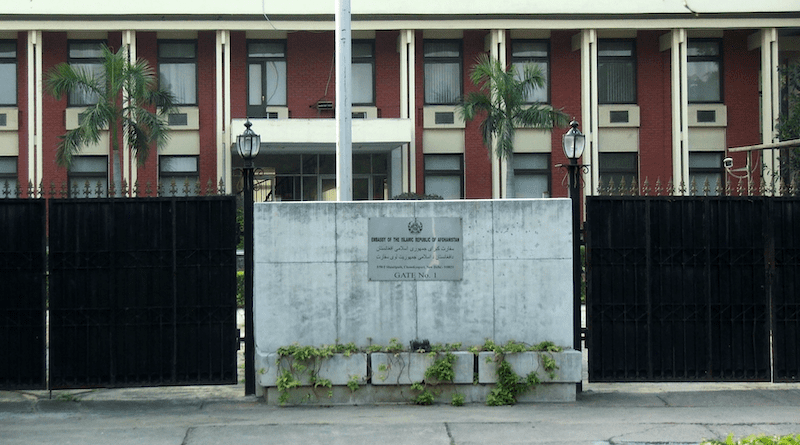Complex Dynamics: Understanding Lack Of Warmth In India-Taliban Relations – OpEd
In the wake of the Taliban’s return to power in Afghanistan, the international community has been closely observing the evolving dynamics between various countries and the newly established regime. One intriguing aspect of this complex web of relationships is the somewhat reserved nature of the interaction between India and the Taliban. This article aims to dissect the underlying factors contributing to India’s cautious approach towards the Taliban and its lack of warmness in their relations.
To understand the current state of India-Taliban relations, it’s crucial to revisit history. During the Taliban’s previous rule in Afghanistan during the 1990s, India maintained strained relations due to the group’s support for Pakistan-based militant organizations. India’s steadfast support for the Northern Alliance, a group opposing the Taliban, further solidified the gap between the two entities. This history has cast a shadow of distrust over the present interactions.
Several factors have significantly shaped India’s approach towards the Taliban:
1. Afghanistan’s Strategic Significance: India views Afghanistan as a vital regional partner. Over the years, India has invested substantially in development projects and infrastructure initiatives in Afghanistan, fostering cultural and historical ties. The Chabahar Port project and the construction of the Salma Dam are just a couple of examples highlighting India’s commitment to Afghanistan’s stability and growth.
2. Security Concerns: India remains wary of the Taliban’s past associations with anti-India militant groups, and the fear of renewed support for such entities under Taliban rule is palpable. India’s focus on preventing any threat emanating from Afghanistan’s soil adds another layer of complexity to the relationship.
Taliban’s Relations with Pakistan
The Taliban’s historically close ties with Pakistan have been a significant factor in India’s approach. These ties have raised suspicions about the extent to which Pakistan may influence the Taliban’s policies. The deep-rooted relationship between the Taliban and Pakistan is a cause for concern, given Pakistan’s alleged support for proxy elements against India.
The international community, including India, expects the Taliban to demonstrate a responsible approach and adhere to their commitments. However, given the Taliban’s past track record of breaking promises, India remains cautious and vigilant about engaging with the group. The international community is looking for concrete actions from the Taliban to ensure stability, human rights, and a peaceful transition in Afghanistan.
India’s Emphasis on Afghan Stability
Besides its strategic interests, India’s focus lies in ensuring Afghan-led and Afghan-owned peace processes. India’s strategy centers on providing humanitarian aid, development assistance, and capacity-building to Afghanistan. While India acknowledges the Taliban’s presence, it is committed to promoting peace and stability through Afghan institutions rather than direct engagement with the group.
India’s approach to Afghanistan is also influenced by its strategic partnerships in the region. Ties with the United States, its relations with Iran and Russia, and its role in regional stability all factor into India’s stance. Balancing its regional and international interests requires India to carefully navigate the intricate geopolitical landscape.
Human Rights and Global Reputation
India’s commitment to democratic values and human rights shapes its approach towards the Taliban. The group’s record on human rights, particularly with regard to women’s rights and freedom of expression, is a significant concern for India. Given India’s global reputation as a democratic nation, engaging with a group with a tarnished human rights record requires careful consideration.
The return of the Taliban has implications for regional security and stability. India, along with other neighboring countries, is concerned about the potential for increased radicalism and instability stemming from Afghanistan. This concern further contributes to India’s measured stance towards the Taliban.
India’s economic investments in Afghanistan cannot be overlooked. Projects such as the Chabahar Port and connectivity initiatives are essential for both regional economic growth and India’s geopolitical interests. However, the uncertainty surrounding the fate of ongoing projects under Taliban rule poses challenges for India’s economic engagement.
Conclusion
The reserved nature of India-Taliban relations is a product of intricate historical, geopolitical, and security considerations. While India remains committed to Afghanistan’s stability, development, and peace, it does so with a pragmatic and cautious approach. As the international community navigates the complexities of the new Afghan reality, India’s stance underscores its commitment to safeguarding regional interests while ensuring the well-being of the Afghan people. In the midst of a changing geopolitical landscape, India’s approach to the Taliban issue remains grounded in its core values and strategic imperatives.

